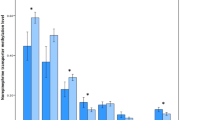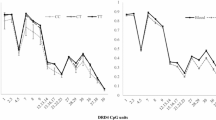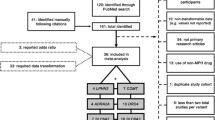Abstract
In view of the need for easily accessible biomarkers, we evaluated in ADHD children the epigenetic status of the 5′-untranslated region (UTR) in the SLC6A3 gene, coding for human dopamine transporter (DAT). We analysed buccal swabs and sera from 30 children who met DSM-IV-TR criteria for ADHD, assigned to treatment according to severity. Methylation levels at six-selected CpG sites (among which, a CGGCGGCGG and a CGCG motif), alone or in combination with serum titers in auto-antibodies against dopamine transporter (DAT aAbs), were analysed for correlation with CGAS scores (by clinicians) and Conners’ scales (by parents), collected at recruitment and after 6 weeks. In addition, we characterized the DAT genotype, i.e., the variable number tandem repeat (VNTR) polymorphisms at the 3′-UTR of the gene. DAT methylation levels were greatly reduced in ADHD patients compared to control, healthy children. Within patients carrying at least one DAT 9 allele (DAT 9/x), methylation at positions CpG2 and/or CpG6 correlated with recovery, as evident from delta-CGAS scores as well as delta Conners’ scales (‘inattentive’ and ‘hyperactive’ subscales). Moreover, hypermethylation at CpG1 position denoted severity, specifically for those patients carrying a DAT 10/10 genotype. Intriguingly, high serum DAT-aAbs titers appeared to corroborate indications from high CpG1 versus high CpG2/CpG6 levels, likewise denoting severity versus recovery in DAT 10/10 versus 9/x patients, respectively. These profiles suggest that DAT 5′UTR epigenetics plus serum aAbs can serve as suitable biomarkers, to confirm ADHD diagnosis and/or to predict the efficacy of treatment.


Similar content being viewed by others
References
Abdolmaleky HM, Thiagalingam S, Wilcox M (2005) Genetics and epigenetics in major psychiatric disorders: dilemmas, achievements, applications, and future scope. Am J Pharmacogenom 5:149–160
Adriani W, Koot S, Columba-Cabezas S, Romano E, Travaglini D, van den Bos R, Granstrem O, Ali SF, Laviola G (2012) Immunization with DAT fragments is associated with long-term striatal impairment, hyper-activity and reduced cognitive flexibility in mice. Behav Brain Funct 8:54
Albayrak Ö, Friedel S, Schimmelmann BG, Hinney A, Hebebrand J (2008) Genetic aspects in attention-deficit/hyperactivity disorder. J Neural Transm 115(2):305–315
Auci DL, Fikrig S, Rodriquez J (1997) Methylphenidate and the immune system. J Am Acad Child Adolesc Psychiatry 36:1015–1016
Bell JT, Pai AA, Pickrell JK, Gaffney DJ, Pique-Regi R, Degner JF et al (2011) DNA methylation patterns associate with genetic and gene expression variation in HapMap cell lines. Genome Biol 12:R10
Bannon MJ (2005) The dopamine transporter: role in neurotoxicity and human disease. Toxicol Appl Pharmacol 204:355–360
Berridge KC (2007) The debate over dopamine’s role in reward: the case for incentive salience. Psychopharmacology 191:391–431
Biederman J, Monuteaux MC, Mick E, Spencer T, Wilens TE, Silva JM, Snyder LE, Faraone SV (2006) Young adult outcome of attention deficit hyperactivity disorder: a controlled 10-year follow-up study. Psychol Med 36:167–179
Brenet F, Moh M, Funk P, Feierstein E, Viale AJ, Socci ND, Scandura JM (2011) DNA methylation of the first exon is tightly linked to transcriptional silencing. PLoS ONE 6:e14524
Buttarelli FR, Fanciulli A, Pellicano C, Pontieri FE (2011) The dopaminergic system in peripheral blood lymphocytes: from physiology to pharmacology and potential applications to neuropsychiatric disorders. Curr Neuropharmacol 9:278–288
Caspi A, McClay J, Moffitt TE, Mill J, Martin J, Craig IW et al (2002) Role of genotype in the cycle of violence in maltreated children. Science 297(5582):851–854
Chambers RA, Potenza MN (2003) Neurodevelopment, impulsivity, and adolescent gambling. J Gambl Stud 19:53–84
Cheon KA, Ryu YH, Kim JW, Cho DY (2003) The homozygosity for 10-repeat allele at dopamine transporter gene and dopamine transporter density in Korean children with attention deficit hyperactivity disorder: relating to treatment response to methylphenidate. Eur Neuropsychopharmacol 15:95–101
Cicchetti D, Dawson G (2002) Editorial: multiple levels of analysis. Dev Psychopathol 14(03):417–420
Cicchetti D, Rogosch FA (1996) Equifinality and multifinality in developmental psychopathology. Dev Psychopathol 8:597–600
Cicchetti D, Rogosch FA (1999) Psychopathology as risk for adolescent substance use disorders: a developmental psychopathology perspective. J Clin Child Psychol 28(3):355–365
Cook EH, Stein MA, Krasowski MD, Cox NJ, Olkon DM, Kieffer JE et al (1995) Association of attention-deficit disorder and the dopamine transporter gene. Am J Hum Genet 56:993–998
Cortese S (2012) The neurobiology and genetics of attention-deficit/hyperactivity disorder (ADHD): what every clinician should know. Eur J Paediatr Neurol 16:422–433
Cosentino M, Fietta AM, Ferrari M, Rasini E, Bombelli R, Carcano E, Saporiti F, Meloni F, Marino F, Lecchini S (2007) Human CD4+CD25+ regulatory T cells selectively express tyrosine hydroxylase and contain endogenous catecholamines subserving an autocrine/paracrine inhibitory functional loop. Blood 109(2):632–642
Curatolo P, Paloscia C, D’Agati E, Moavero R, Pasini A (2009) The neurobiology of attention deficit/hyperactivity disorder. Eur J Paediatr Neurol 13:299–304
Curtis WJ, Cicchetti D (2007) Emotion and resilience: a multilevel investigation of hemispheric electroencephalogram asymmetry and emotion regulation in maltreated and non-maltreated children. Dev Psychopathol 19(03):811–840
D’Addario C, Dell’Osso B, Galimberti D, Palazzo MC, Benatti B, Di Francesco A, Scarpini E, Altamura AC, Maccarrone M (2013) Epigenetic modulation of BDNF gene in patients with major depressive disorder. Biol Psychiatry 73:e6–e7
D’Addario C, Dell’Osso B, Palazzo MC, Benatti B, Lietti L, Cattaneo E, Galimberti D, Fenoglio C, Cortini F, Scarpini E, Arosio B, Di Francesco A, Di Benedetto M, Romualdi P, Candeletti S, Mari D, Bergamaschini L, Bresolin N, Maccarrone M, Altamura AC (2012) Selective DNA methylation of BDNF promoter in bipolar disorder: differences among patients with BDI and BDII. Neuropsychopharmacology 37:1647–1655
D’Addario C, Micale V, Di Bartolomeo M, Stark T, Pucci M, Sulcova A, Palazzo M, Babinska Z, Cremaschi L, Drago F, Altamura AC, Maccarrone M, Dell’Osso B (2017) A preliminary study of endocannabinoid system regulation in psychosis: Distinct alterations of CNR1 promoter DNA methylation in patients with schizophrenia. Schizophr Res, in Press (EPub Jan 17)
Dalmau J, Lancaster E, Martinez-Hernandez E, Rosenfeld MR, Balice-Gordon R (2011) Clinical experience and laboratory investigations in patients with anti-NMDAR encephalitis. Lancet Neurol 10:63–74
Das S, Kubota T, Song M, Daniel R, Berry-Kravis EM, Prior TW, Popovich B, Rosser L, Arinami T, Ledbetter DH (1997) Methylation analysis of the fragile X syndrome by PCR. Genet Test 1:151–155
Dell’Osso B, D’Addario C, Palazzo MC, Benatti B, Camuri G, Galimberti D, Fenoglio C, Scarpini E, Di Francesco A, Maccarrone M, Altamura AC (2014) Epigenetic modulation of BDNF gene: differences in DNA methylation between unipolar and bipolar patients. J Affect Disord 166:330–333
Docherty SJ, Davis OS, Haworth CM, Plomin R, D’Souza U, Mill J (2012) A genetic association study of DNA methylation levels in the DRD4 gene region finds associations with nearby SNPs. Behav Brain Funct 8:31
Doerfler W (1983) DNA methylation and gene activity. Annu Rev Biochem 52:93–124
Egger G, Liang G, Aparicio A, Jones PA (2004) Epigenetics in human disease and prospects for epigenetic therapy. Nature 429:457–463
Faraone SV, Perlis RH, Doyle AE, Smoller JW, Goralnick JJ, Holmgren MA et al (2005) Molecular genetics of attention deficit/hyperactivity disorder. Biol Psychiatry 57:1313–1323
Faraone SV, Bonvicini C, Scassellati C (2014) Biomarkers in the diagnosis of ADHD—promising directions. Curr Psychiatry Rep 16:497
Gainetdinov RR, Caron MG (2003) Monoamine transporters: from genes to behavior. Annu Rev Pharmacol Toxicol 43:261–284
Giana G, Romano E, Porfirio MC, D’Ambrosio R, Giovinazzo S, Troianiello M, Barlocci E, Travaglini D, Granstrem O, Pascale E, Tarani L, Curatolo P, Laviola G, Adriani W (2015) Detection of auto-antibodies to DAT in the serum: interactions with DAT genotype and psycho-stimulant therapy for ADHD. J Neuroimmunol 278:212–222
Grayson DR, Chen Y, Costa E, Dong E, Guidotti A, Kundakovic M, Sharma RP (2006) The human reelin gene: transcription factors (+), repressors (−) and the methylation switch (±) in schizophrenia. Pharmacol Ther 111:272–286
Graus F, Saiz A, Dalmau J (2010) Antibodies and neuronal autoimmune disorders of the CNS. J Neurol 257:509–517
Graus F, Saiz A, Lai M, Bruna J, López F, Sabater L, Blanco Y, Rey MJ, Ribalta T, Dalmau J (2008) Neuronal surface antigen antibodies in limbic encephalitis: clinical-immunologic associations. Neurology 71:930–936
Greenwood TA, Kelsoe JR (2003) Promoter and intronic variants affect the transcriptional regulation of the human dopamine transporter gene. Genomics 82:511–520
Heinz A, Goldman D, James DW, Palmour R, Hommer D, Gorey JG et al (2000) Genotype influences in vivo dopamine transporter availability in human striatum. Neuropsychopharmacology 22:133–139
Henikoff S, Matzke MA (1997) Exploring and explaining epigenetic effects. Trends Genet 13:293–295
Hillemacher T, Frieling H, Buchholz V, Hussein R, Bleich S, Meyer C, John U, Bischof A, Rumpf HJ (2015) Alterations in DNA-methylation of the dopamine-receptor 2 gene are associated with abstinence and health care utilization in individuals with a lifetime history of pathologic gambling. Prog Neuropsychopharmacol Biol Psychiatry 63:30–34
Hoekstra PJ, Minderaa RB (2005) Tic disorders and obsessive-compulsive disorder: is autoimmunity involved? Int Rev Psychiatry 17:497–502
Hollander E, Buchalter AJ, DeCaria CM (2000) Pathological gambling. Psychiatr Clin North Am 23:629–642
Hollander E, Sood E, Pallanti S, Baldini-Rossi N, Baker B (2005) Pharmacological treatments of pathological gambling. J Gambl Stud 21:99–110
Holliday R (1987) DNA methylation and epigenetic defects in carcinogenesis. Mutat Res 181:215–217
Jirtle RL, Skinner MK (2007) Environmental epigenomics and disease susceptibility. Nat Rev Genet 8:253–262
Joober R, Grizenko N, Sengupta S, Amor LB, Schmitz N, Schwartz G, Karama S, Lageix P, Fathalli F, Torkaman-Zehi A, Ter Stepanian M (2007) Dopamine transporter 3′-UTR VNTR genotype and ADHD: a pharmaco-behavioural genetic study with methylphenidate. Neuropsychopharmacology 32:1370–1376
Jucaite A, Fernell E, Halldin C, Forssberg H, Farde L (2005) Reduced midbrain dopamine transporter binding in male adolescents with attention-deficit/hyperactivity disorder: association between striatal dopamine markers and motor hyperactivity. Biol Psychiatry 57:229–238
Lai M, Hughes EG, Peng X, Zhou L, Gleichman AJ, Shu H, Matà S, Kremens D, Vitaliani R, Geschwind MD, Bataller L, Kalb RG, Davis R, Graus F, Lynch DR, Balica-Gordon R, Dalmau J (2009) AMPA receptor antibodies in limbic encephalitis alter synaptic receptor location. Ann Neurol 65:424–434
Lancaster E, Lai M, Peng X, Hunghes E, Constantinescu R, Raizer J, Friedman D, Skeen MB, Grisold W, Kimura A, Ohta K, Iizuka T, Guzman M, Graus F, Moss SJ, Balice-Gordon R, Dalmau J (2010) Antibodies to the GABA(B) receptor in limbic encephalitis with seizures: case series and characterisation of the antigen. Lancet Neurol 9:67–76
Levenson JM, Sweatt JD (2006) Epigenetic mechanisms: a common theme in vertebrate and invertebrate memory formation. Cell Mol Life Sci 63:1009–1016
Lopez-Serra L, Ballestar E, Fraga MF, Alaminos M, Setein F, Esteller M (2006) A profile of methyle CpG binding domain protein occupancy of hypermethylated promoter CpG islands in tumor suppressor genes in human cancer. Cancer Res 66:8342–8346
Kelada SN, Costa-Mallen P, Checkoway H, Carlson CS, Weller TS, Swanson PD, Franklin GM, Longstreth WT Jr, Afsharinejad Z, Costa LG (2005) Dopamine transporter (SLC6A3) 5′ region haplotypes significantly affect transcriptional activity in vitro but are not associated with Parkinson’s disease. Pharmacogenet Genom 15:659–668
Kipnis J, Cardon M, Avidan H, Lewitus GM, Mordechay S, Rolls A, Shani Y, Schwartz M (2004) Dopamine, through the extracellular signal-regulated kinase pathway, downregulates CD4 + CD25 + regulatory T-cell activity: implications for neurodegeneration. J Neurosci 24:6133–6143
Martinez D, Gelernter J, Abi-Dargham A, van Dyck CH, Kegeles L, Innis RB et al (2001) The variable number of tandem repeats polymorphism of the dopamine transporter gene is not associated with significant change in dopamine transporter phenotype in humans. Neuropsychopharmacology 24:553–560
Martins C, Gaffan EA (2000) Effects of early maternal depression on patterns of infant-mother attachment: a meta-analytic investigation. J Child Psychol Psychiatry 41(6):737–746
Milani L, Lundmark A, Nordlund J, Kiialainen A, Flaegstad T, Jonmundsson G, Kanerva J, Schmiegelow K, Gunderson KL, Lönnerholm G, Syvänen AC (2009) Allele-specific gene expression patterns in primary leukemic cells reveal regulation of gene expression by CpG site methylation. Genome Res 19:1–11
Mill J, Asherson P, Browes C, D’Souza U, Craig I (2002) Expression of the dopamine transporter gene is regulated by the 3′-UTR VNTR: evidence from brain and lymphocytes using quantitative RT-PCR. Am J Med Genet 114:975–979
Mill J, Tang T, Kaminsky Z, Khare T, Yazdanpanah S, Bouchard L et al (2008) Epigenomic profiling reveals DNA-methylation changes associated with major psychosis. Am J Hum Genet 82:696–711
Mollet IG, Malm HA, Wendt A, Orho-Melander M, Eliasson L (2016) Integrator of stress responses calmodulin binding transcription activator 1 (Camta1) regulates miR-212/miR-132 expression and insulin secretion. J Biol Chem 291:18440–18452
Oades RD (1998) Frontal, temporal and lateralized brain function in children with attention-deficit hyperactivity disorder: a psychophysiological and neuropsychological viewpoint on development. Behav Brain Res 94:83–95
Pacheco R, Contreras F, Zouali M (2014) The dopaminergic system in autoimmune diseases. Front Immunol 5:117
Pacheco R, Riquelme E, Kalergis AM (2010) Emerging evidence for the role of neurotransmitters in the modulation of T cell responses to cognate ligands. Cent Nerv Syst Agents Med Chem 10:65–83
Pasini A, Sinibaldi L, Paloscia C, Douzgou S, Pitzianti MB, Romeo E, Curatolo P, Pizzuti A (2013) Neurocognitive effects of methylphenidate on ADHD children with different DAT genotypes: a longitudinal open label trial. Eur J Paediatr Neurol 17:407–414
Petronis A (2003) Epigenetics and bipolar disorder: new opportunities and challenges. Am J Med Genet C Semin Med Genet 123C:65–75
Pidsley R, Mill J (2011) Research Highlights: epigenetic changes to serotonin receptor gene expression in schizophrenia and bipolar disorder. Epigenomics 3:537–538
Polanczyk G, De Lima MS, Horta BL, Biederman J, Rohde LA (2007) The worldwide prevalence of ADHD: a systematic review and metaregression analysis. Am J Psychiatry 164:942–948
Purper-Ouakil D, Ramoz N, Lepagnol-Bestel AM, Gorwood P, Simonneau M (2011) Neurobiology of attention deficit/hyperactivity disorder. Pediatr Res 69:69–76
Rizzo R, Gulisano M, Calì PV, Curatolo P (2010) ADHD and epilepsy in children with Tourette syndrome: a triple comorbidity? Acta Paediatr 99:1894–1896
Rizzo R, Gulisano M, Calì PV, Curatolo P (2013) Tourette Syndrome and comorbid ADHD: current pharmacological treatment options. Eur J Paediatr Neurol 17:421–428
Sagvolden T, Sergeant JA (1998) Attention deficit/hyperactivity disorder—from brain dysfunction to behaviour. Behav Brain Res 94:1–10
Sarkar C, Basu B, Chakroborty D, Dasgupta PS, Basu S (2010) The immunoregulatory role of dopamine: an update. Brain Behav Immun 24:525–528
Shen C, Yang Y, Du L, Wang H (2015) Calmodulin-binding transcription activators and perspectives for applications in biotechnology. Appl Microbiol Biotechnol 99:10379–10385
Tabolacci E, Chiurazzi P (2013) Epigenetics, fragile X syndrome and transcriptional therapy. Am J Med Genet A. 161A:2797–2808
Thapar A, Holmes J, Poulton K, Harrington R (1999) Genetic basis of attention deficit and hyperactivity. Br J Psychiatry 174(2):105–111
Tronick E, Hunter RG (2016) Waddington, dynamic systems, and epigenetics. Front Behav Neurosci 10:107
Tsankova N, Renthal W, Kumar A, Nestler EJ (2007) Epigenetic regulation in psychiatric disorders. Nat Rev Neurosci 8:355–367
Wallis D (2010) The search for biomarkers for attention deficit/hyperactivity disorder. Drug News Perspect 23:438–449
Yang B, Chan RC, Jing J, Li T, Sham P, Chen RY (2007) A meta-analysis of association studies between the 10-repeat allele of a VNTR polymorphism in the 3′-UTR of dopamine transporter gene and attention deficit hyperactivity disorder. Am J Med Genet B Neuropsychiatr Genet 144B:541–550
Zandi MS, Irani SR, Lang B, Waters P, Jones PB, McKenna P, Coles AJ, Vincent A, Lennox BR (2010) Disease-relevant autoantibodies in first episode schizophrenia. J Neurol 258:686–688
Zhang D, Cheng L, Badner JA, Chen C, Chen Q, Luo W et al (2010) Genetic control of individual differences in gene-specific methylation in human brain. Am J Hum Genet 86:411–419
Zoratto F, Romano E, Pascale E, Pucci M, Falconi A, Dell’Osso B, Maccarrone M, Laviola G, D’Addario C, Adriani W (2017) Down-regulation of serotonin and dopamine transporter genes in individual rats expressing a gambling-prone profile: a possible role for epigenetic mechanisms. Neuroscience 340:101–116
Zuliani L, Graus F, Giometto B, Bien C, Vincent A (2012) Central nervous system neuronal surface antibody associated syndrome: review and guidelines for recognition. J Neurol Neurosurg Psychiatry 83:638–645
Acknowledgements
Research performed under the young-investigator “ADHD-sythe” project (“under 40” call 2007) and the EU “NeuroGenMRI” project (ERAnet “PrioMedChild”), both from Italian Ministry of Health (for Italian partner, to W. A.); in part, supported under Grant Agreements ref. 278367 “EMTICS—European Multicentre Tics In Children Studies” and ref. 603016 “MATRICS—Multidisciplinary Approaches to Translational Research In Conduct Syndromes” by European Seventh Framework Programme (FP7) 2007–2013 (for Italian partner, to G. L.). We acknowledge Dr Nadia Francia and Dr Viola Cardia for their precious help with all management and patenting issues. There are only two items for potential conflict of interest to be disclosed: (1) Adriani W, Laviola G, Pascale E, D’Addario C “Metodo Per Determinare Il Deficit Di Attenzione Con Iperattività (Method to determine attention deficit and hyperactivity disorder)”; Patent Application, deposit in ITALY at No. 102016000129938 (22-DECEMBER-2016). (2) Granstrem O, Adriani W, Laviola G, Porfirio MC, Curatolo P “Biomarkers for validation of A.D.H.D. diagnosis and monitoring of therapy efficacy”; Full Patent No. PN810701WO; Int.l Application No. PCT/EP2013/066845; Publication number WO/2014/023852 (10-AUGUST-2013).
Author information
Authors and Affiliations
Corresponding author
Rights and permissions
About this article
Cite this article
Adriani, W., Romano, E., Pucci, M. et al. Potential for diagnosis versus therapy monitoring of attention deficit hyperactivity disorder: a new epigenetic biomarker interacting with both genotype and auto-immunity. Eur Child Adolesc Psychiatry 27, 241–252 (2018). https://doi.org/10.1007/s00787-017-1040-9
Received:
Accepted:
Published:
Issue Date:
DOI: https://doi.org/10.1007/s00787-017-1040-9




